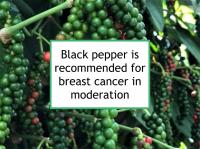Ground black pepper (Piper nigrum) is one of the most commonly consumed spices. Black pepper has been shown to have antioxidant, anti-inflammatory, antibacterial and antimutagenic properties and helps improve digestion. Black pepper is a dietary source of vitamin C, vitamin K and manganese.
The spiciness of black pepper is due to its piperine content. Piperine has been shown to significantly increase the bioavailability of selenium and beta-carotene, among other nutrients. Piperine has been shown to mitigate the harmful effects of cadmium exposure. Black pepper and piperine have been shown to inhibit the development of carcinogen-induced colon and lung cancers in laboratory animals.
Breast cancer-related effects of consuming black pepper
The black pepper compounds piperine and β-caryophyllene oxide have been shown to reduce breast cancer cell proliferation, angiogenesis, and metastasis in the laboratory. β-caryophyllene oxide interferes with multiple signaling cascades involved in tumorigenesis. Piperine reduces the growth of breast cancer cells without affecting the growth of normal breast cells. Piperine has been shown to inhibit the growth and motility of triple negative breast cancer cells. One study that administered piperine-free black pepper extract to rats found that the extract reduced carcinogen-induced mammary tumors, indicating that other black pepper compounds also have chemopreventive effects.
Piperine may enhance the effectiveness of Adriamycin (doxorubicin), Taxol (paclitaxel) and 5-FU chemotherapy, as well as radiotherapy. Piperine has also been shown to enhance breast cancer cell sensitivity to curcumin, a component of the spice turmeric.
Additional comments
Black pepper is made by grinding the dried, immature berries of Piper nigrum. White pepper, which is made from the dried, mature berries of Piper nigrum from which the outer covering has been removed, contains significantly less piperine than black pepper. Pink peppercorns come from a completely different plant (Schinus molle).
Most black peppercorns sold in the U.S. are imported from India, Indonesia, Malaysia, Brazil or Vietnam. Buying whole peppercorns protects against the possibility of purchasing ground pepper that has been mixed with other materials.
Long pepper or Indian long pepper (Piper longum) is closely related to black pepper. The plant produces brownish-black flower spikes containing numerous tiny fruits. The spikes are typically dried and used as a seasoning in Indian and other South Asian cooking. Like black pepper, the fruits contain piperine. Available research suggests that long pepper shares the chemopreventive qualities of black pepper.
Black pepper sold in the U.S. often has been irradiated to remove pathogenic microorganisms and fungi. More traditional sterilization methods include fumigation and steam sterilization. Some of the chemicals used in fumigation are considered harmful to human health. Steam treatment results in a considerable loss of piperine content. While irradiation results in a greater loss of vitamin C in black pepper than steam treatment, it preserves most of the piperine content.
Piperidine (hexahydropyridine) is a poison and should be avoided.
Sources of information provided in this webpage
The information above, which is updated continually as new research becomes available, has been developed based solely on the results of academic studies. Clicking on any of the underlined terms will take you to its tag or webpage, which contain more extensive information.
Below are links to 20 recent studies concerning this food and its components. For a more complete list of studies, please click on black pepper.
